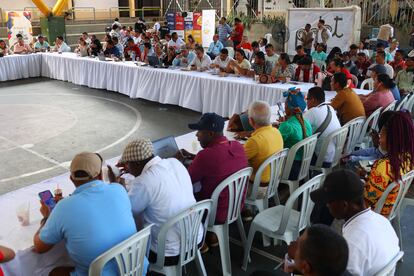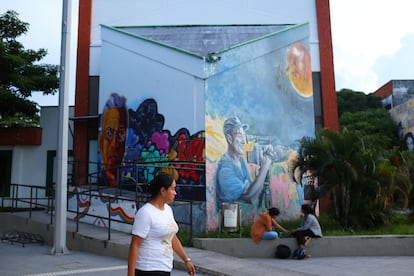The heat of the Orinoquía can be felt this Thursday afternoon on the sports field of the General Santander school, in the center of Arauca, which serves as an auditorium. “Thanks to your resistance, it was not possible to tear up the peace agreement,” Raúl Delgado, director of the Agency for the Renewal of the Territory (ART) in the Government of Gustavo Petro, tells those present. It is an accountability hearing that coincides with a regional dialogue with community tables, so it brings together all kinds of social leaders, officials and representatives of peasant, Afro and indigenous communities in one of the many corners of Colombia hit by an armed conflict of more than half a century that society longs to leave behind. “You have persisted in the dream of the transformation of these territories,” he acknowledges.
The ART headed by Delgado is a key entity for bringing investments to historically excluded places, a stated goal of the current president. It is in charge of implementing one of the main goals of the peace agreement signed at the end of 2016 with the extinct FARC guerrilla group: the Territorial Development Programs that seek to transform forever the 170 municipalities most affected by the war, known as PDET in the institutional jargon derived from that historic pact. Together, they occupy more than a third of Colombia’s geography and add up to nearly seven million inhabitants. They are spread throughout the country.
In Arauca, without going too far, all kinds of violence have come together. At the turn of the century, it was the scene of a bloody paramilitary attack and, years later, of a fierce confrontation between the extinct FARC and the ELN, the last armed guerrilla group that is now negotiating with the government within the framework of total peace. Even in its capital, which shares its name with the department and the river that separates it from Venezuela, the fragility of the Colombian state is combined with the persistence of armed actors, which now also include dissidents. In this border department alone, there are four PDET municipalities: Tame, Saravena, Fortul and Arauca.
Delgado’s political career (Pasto, 65 years old) is associated with another border department hit by violence, but in this case neighboring Ecuador, in the other corner of Colombia. He has been both mayor of Pasto (2002-2007) and governor of Nariño (2012-2015), as well as deputy minister of the Interior between 2016 and 2018. Since October 2022, he has been at the head of the ART. “We set out to rebuild trust with the communities. It is a difficult process in which we have been advancing,” he tells this newspaper in the framework of the Arauca event. Now he is, among other things, in charge of updating the Territorial Plans for Regional Transformation (PATR) that materialize the PDETs. By law, they must be reviewed participatively every five years, which is half of the ten-year period originally planned for the PDETs. A moment that he describes as a “unique opportunity.”
“One of the objectives is that, now, these plans have a chapter on programs and projects, prioritizing those with a strategic impact, defining responsibilities of the different levels of government and a clear implementation route,” he says. “At the end of the process we will have a community mandate, and that is to move forward in adopting this permanent state public policy for the inclusion of excluded territories, such as the PDETs,” he reiterates. That would mean, he details, structural changes in the budgetary allocations of royalties, the general system of participations and, above all, the general budget of the nation. The ten-year period, Delgado points out, is insufficient: “That is why we speak, from our perspective, of a permanent state public policy for the inclusion and convergence of excluded territories.”
Newsletter
Analysis of current events and the best stories from Colombia, every week in your inbox
RECEIVE THE
The director of ART echoes the words of President Petro, who in recent speeches has complained that public investment has continued to be made as if the peace agreement had not been signed. He has also said that in many cases the investment did not reach the excluded communities and remained in the pockets of contractors. “The peace agreement is in tatters, that is the reality. They tore it to shreds and that is why we have new violence. Now, it is not about crying over what has already happened, but about seeing what we do going forward,” Petro lamented less than two weeks ago at the first national meeting of beneficiaries of the Comprehensive Program for the Substitution of Illicit Crops.

As the president has done, Delgado also highlights the underestimation of costs as one of the flaws. “In 2018, it was estimated that the implementation of the PDETs would have an approximate cost of 80 billion,” with the additional problem that responsibility was largely transferred to territorial entities, he explains. “This has led us to conclude that these resources are definitely insufficient, that there is a need for extended deadlines, new sources of financing and, more fundamentally, structurally speaking, the need for a state public policy for the inclusion of excluded territories,” he says.
“Compliance with the peace agreement is reinforced by the total peace policy,” Delgado argues. “If the agreement is not complied with, it is difficult to create confidence in the new negotiations, but at the same time the progress in the new negotiations – especially of a humanitarian nature – helps to ensure compliance with the peace agreement,” he argues. “What is the point of inaugurating the most beautiful school in a PDET territory if one of these groups kills the teacher at the entrance of the school?”
Many of Petro’s critics point out, in turn, that the multiple negotiations for total peace have hampered efforts to implement the 2016 agreement. Delgado disagrees. “I say this as a
first-hand witness, if the president insists on anything, it is that the peace agreement must be fulfilled as an obligation of Colombia to the world,” he says. “And he has asked for something more concrete, to direct what remains of our execution in 2024, the investments of 2025-2026 and also to prioritize in the future terms that our Government leaves committed, the PDET territories and other excluded territories,” he says. “I do not see that contradiction.”

Subscribe here to the EL PAÍS newsletter on Colombia and Here on the WhatsApp channeland receive all the latest news from the country.
#Petro #government #territorial #transformation #agreed #peace #agreement


